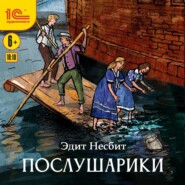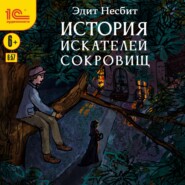По всем вопросам обращайтесь на: info@litportal.ru
(©) 2003-2024.
✖
The Literary Sense
Настройки чтения
Размер шрифта
Высота строк
Поля
"I'm really not mad," he said; "but it does seem so frightfully silly that we should travel all the way to – to wherever you are going, and not tell each other how good June weather is."
"Well – it is!" she owned.
He eagerly spoke: he wanted to entangle her in talk before her conventional shrinking from chance acquaintanceship should shrivel her interest past hope.
"I often think how silly people are," he said, "not to talk in railway carriages. One can't read without blinding oneself. I've seen women knit, but that's unspeakable. Many a time in frosty, foggy weather, when the South Eastern has taken two hours to get from Cannon Street to Blackheath, I've looked round the carriage and wanted to say, 'Gentlemen, seeing that we are thus delayed, let us each contribute to the general hilarity by telling a story – we might gather them into a Christmas number afterwards – in the manner of the late Mr. Charles Dickens,' then I've looked round the carriage full of city-centred people, and wondered how they'd deal with the lunatic who ventured to suggest such an All-the-year-round idea. But nobody could be city-centred on such a day, and so early. So let's talk."
She had laughed, as he had meant her to laugh. Now she seemed to throw away some scruple in the gesture with which she shrugged her shoulders and turned to him.
"Very well," she said, and she was smiling. "Only I've nothing to say."
"Never mind; I have," he rejoined, and proceeded to say it. It seemed amusing to him as an experiment to talk to this girl, this perfect stranger, with a delicate candour that he would not have shown to his oldest friend. It seemed interesting to lay bare, save for a veiling of woven transparent impersonality, his inmost mind. It was interesting, for the revelation drew her till they were talking together in a world where it seemed no more than natural for her to show him her soul: and she had no skill to weave veils for it.
Such talk is rare: so rare and so keen a pleasure, indeed, as to leave upon one's life, if one be not a poet, a mark strong and never to be effaced.
The slackening of the train at Halstead broke the spell which lay on both with a force equal in strength, if diverse in kind.
"Oh!" she said, "I get out here. Good-bye, good-bye."
He would not spoil the parting by banalities of hat-raising amid the group of friends or relations who would doubtless meet her.
"Good-bye," he said, and his eyes made her take his offered hand. "Good-bye. I shall never forget you. Never!"
And then it seemed to him that the farewell lacked fire: and he lifted her hand to his face. He did not kiss it. He laid it against his cheek, sighed, and dropped it. The action was delicate and very effective. It suggested the impulse, almost irresistible yet resisted, the well-nigh overwhelming longing to kiss the hand, kept in check by a respect that was almost devotion.
She should have torn her hand away. She took it away gently, and went.
Leisurely he got out of the train. She had disappeared. Well – the bright little interlude was over. Still, it would give food for dreams among the ferny woods. The first lines of a little song hummed themselves in his brain —
"Eyes like stars in the night of life,
Seen but a moment and seen for ever."
He would finish them and send them to the Pall Mall Gazette. That would be a guinea.
He wished the journey had been longer. He would never see her again. Perhaps it was just as well. He crushed that last thought. It would be good to dwell through the day on the thought of her – the almost loved, the wholly lost.
"That could but have happened once
And we missed it, lost it for ever!"
Her eyes were very pretty, especially when they opened themselves so widely as she tried to express the thoughts that no one but he had ever cared to hear expressed. The definite biography – dead father, ailing mother – hard work – hard life – hard-won post as High School Mistress, were but as the hoarding on which was pasted the artistic poster of their meeting – their parting. He sighed as he walked along the platform. The promise of June had fulfilled itself: he was rich in a sorrow that did not hurt – a regret that did not sting. Poor little girl! Poor pretty eyes! Poor timid, brave maiden-soul!
Suddenly in his walk he stopped short.
Obliquely through the door of the booking-office he saw her. She was alone. No troops of friends or relations had borne her off. She was waiting for someone; and someone had not come.
What was to be done? He felt an odd chill. If he had only not taken her hand in that silly way which had seemed at the time so artistically perfect. The railway carriage talk might have been prolonged prettily, indefinitely. But that foolish contact had rung up the curtain on a transformation scene, whose footlights needed, at least, a good make-up for the facing of them.
She stood there – looking down the road; in every line of her figure was dejection; hopelessness itself had drawn the line of her head's sideward droop. His make-up need be but of the simplest.
She had expected to meet someone, and someone had not come.
His chivalric impulses, leaping to meet the occasion's call, bade him substitute a splendid replacement – himself, for the laggard tryst-breaker. Even though he knew that that touch of the hand must inaugurate the second volume of the day's romance.
He came behind her and spoke.
"Hasn't he come?" He did not like himself for saying "he" – but he said it. It belonged to the second volume.
She turned with a start and a lighting of eyes and lips that almost taught him pity. Not quite: for the poet's nature is hard to teach.
"He?" she said, decently covering the light of lips and eyes as soon as might be. "It was a friend. She was to come from Sevenoaks. She ought to be here. We were to have a little picnic together." She glanced at her basket. "I didn't know you were getting out here. Why – " The question died on trembling lips.
"Why?" he repeated. There was a pause.
"And now, what are you going to do?" he asked, and his voice was full of tender raillery for her lost tryst with the girl friend, and for her pretty helplessness.
"I – I don't know," she said.
"But I do!" he looked in her eyes. "You are going to be kind. Life is so cruel. You are going to help me to cheat Life and Destiny. You are going to leave your friend to the waste desolation of this place, if she comes by the next train: but she won't – she's kept at home by toothache, or a broken heart, or some little foolish ailment like that," – he prided himself on the light touch here, – "and you are going to be adorably kind and sweet and generous, and to let me drink the pure wine of life for this one day."
Her eyes drooped. Fully inspired, he struck a master-chord in the lighter key.
"You have a basket. I have a brown paper parcel. Let me carry both, and we will share both. We'll go to Chevening Park. It will be fun. Will you?"
There was a pause: he wondered whether by any least likely chance the chord had not rung true. Then —
"Yes," she said half defiantly. "I don't see why I shouldn't – Yes."
"Then give me the basket," he said, "and hey for the green wood!"
The way led through green lanes – through a green park, where tall red sorrel and white daisies grew high among the grass that was up for hay. The hawthorns were silvery, the buttercups golden. The gold sun shone, the blue sky arched over a world of green and glory. And so through Knockholt, and up the narrow road to the meadow whose path leads to the steep wood-way where Chevening Park begins.
They walked side by side, and to both of them – for he was now wholly lost in the delightful part for which this good summer world was the fitting stage – to both of them it seemed that the green country was enchanted land, and they under a spell that could never break.
They talked of all things under the sun: he, eager to impress her with that splendid self of his; she, anxious to show herself not wholly unworthy. She, too, had read her Keats and her Shelley and her Browning – and could cap and even overshadow his random quotations.
"There is no one like you," he said as they passed the stile above the wood; "no one in this beautiful world."
Her heart replied —
"If there is anyone like you I have never met him, and oh, thank God, thank God, that I have met you now."
Aloud she said —
"There's a place under beech trees – a sort of chalk plateau – I used to have picnics there with my brothers when I was a little girl – "
"Shall we go there?" he asked. "Will you really take me to the place that your pretty memories haunt? Ah – how good you are to me."
As they went down the steep wood-path she slipped, stumbled – he caught her.

















